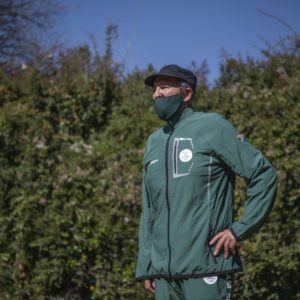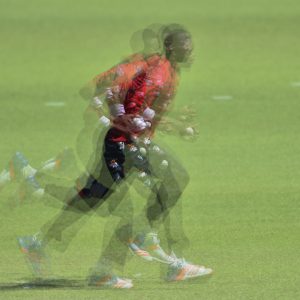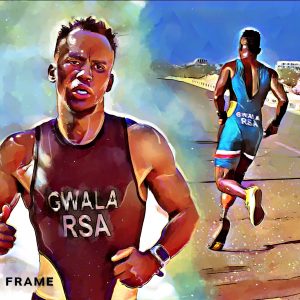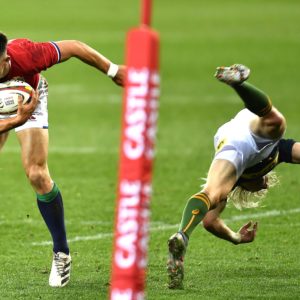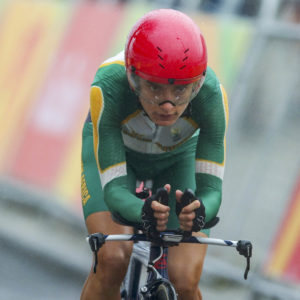An Olympic champion without a medal
Ronald Brown beat cancer to become an Olympian with the Springbok Sevens team. Any battle he faced on the pitch in Japan was nothing compared to what he had to overcome to get there.
Author:
30 July 2021

Springbok Sevens player Ronald Brown broke down when he heard the news while in a small Boland town in the Western Cape with his parents, Ronald and Anita. Filled with disbelief, the tears began to flow. “We were in Robertson when I got the news. We got it before the media. My parents waited for me outside in the car, and when I got the news I couldn’t drive. I was shaking. I had to sit for a few minutes,” he says, smiling.
“I told them I was in the 14-man squad and I’m going to the Olympics! My dad burst out in tears and started shouting. He was so happy. My mom sat still and said nothing. I don’t think she believed me when I said it. My dad, though, couldn’t stop [patting me on my shoulder]. He was so proud of me at that moment.
“At the end of the day it was such an amazing moment, because through the sickness it was them with me the whole time. So to see him like that was such an amazing moment. It was amazing.”
Related article:
After a journey that brought him to the lowest point in his life as he battled to overcome cancer, the 25-year-old was rewarded with his greatest achievement thus far: he became the only non-capped player chosen to represent the Blitzboks at the 2020 Tokyo Olympics.
Earning his first cap against Kenya on 26 July, Brown followed up by scoring two tries against Australia. It was the culmination of a journey that became a triumph of hope over adversity.
The talented winger was spotted while playing for the University of Johannesburg in the Varsity Cup. The national team selectors saw a player who could take the Blitzboks into the World Series. But then came the hardest hammer blow for any athlete, for any person.
The bubble bursts
“I really thought my dreams were being realised. I had just received my first Springbok Sevens contract. I was on top of the world. I had just joined the side and started training with them. But then I got the pain in my chest,” he says.
“I spoke to the team doctor and he looked worried. We did further tests and he told me there was something showing up in my chest that shouldn’t have been there. They sent me for a biopsy in my neck and the results were not what I wanted. I heard I was diagnosed with stage two Hodgkin’s lymphoma. It came at the worst time. I was fit and healthy and I was in a good place with my rugby.
“It came a day after I received my visa to travel with the team to England for my first tournament. It hit me hard. Getting the visa meant I was in with a chance of travelling with the team and it hit me very hard. It stopped everything.”
Related article:
Fortunately, the cancer hadn’t spread extensively yet and there was a good chance of overcoming it. “That kept me positive,” says Brown. “I still knew that I was walking around with a ticking time bomb in my head. It was difficult. My mom took it especially bad. She stressed a lot and when she heard the diagnosis, she thought my rugby career was over. My dad helped a lot in keeping me positive. With my sisters Ronita and Menechia, they kept me positive. Thank goodness I have a great support system, otherwise it would have been easy to fade away into a dark corner.”
Five months of chemotherapy were followed by 18 days of radiation treatment. Initially it went well, but he had a setback in the middle of chemo and things got dark for him.
“My body didn’t want to fight anymore. All the negative, ugly side effects began to take its toll. I had all these questions swirling in my head. Why me? Why now? What did I do wrong? Am I going to get through this? I started losing my hair, I began to be very self-conscious. I’d wear a hat and didn’t want to look at myself in the mirror. If I didn’t hear myself talk, I didn’t recognise the face in the mirror. I couldn’t train and I was irritated.”
The lowest point
One day, near breaking point, Brown felt he couldn’t go on. But his parents, who played a pivotal role when he was at his lowest, brought him back from the brink. “The hospital staff did everything they could for me, but nothing was working,” he remembers that day.
He limped to the bathroom and lay on the floor, not wanting to go on. But his parents spoke softly to him, reminding him of their love and giving him hope. “My father has probably never had a negative thought in his head and if it wasn’t for him that day and the support my mother gave, I wouldn’t be here. He reminded me I can play rugby again. He reminded me of what I have to live for.”
Brown says it took almost an hour to get himself up off the floor. It was touch-and-go whether he would give up the fight. He soldiered on and finally the treatment passed. The biggest test was yet to come for him, though, as the first scans after his long treatment would be decisive for the future of his career.
Related article:
He was stressed. His family accompanied him to the doctor. When the results came, it was good news. “I immediately had tears in my eyes. There was a load off my shoulders. I was very emotional, I couldn’t help it. I had hope again.”
Slowly the long road back began, and Brown found a Springbok Sevens team waiting with open arms for him to arrive. He worked harder than ever, needing something to focus on. “It was a dream for me to make a Springbok team, but I never could have dreamt the Olympics would have been the place to do that. I never thought it would be now.
“To be honest, with the pandemic that happened, it left me a lot more mature in terms of my play. If it was last year, as the Olympics were planned, I don’t think I would have made it into the team. It is a dream that is a reality now, and I’m really excited about it.”
Related article:
What began as a dream became a personal crusade for Brown. And while he was the most inexperienced player and one of the youngest in the squad, he certainly had the drive and motivation to work towards getting selected for the Olympics.
“I’ve always been someone who has a lot of fight in him and wants to learn and get better. It was tough to make the team, but the hard work was rewarded. I have gone through tough times, and when it came close to the Olympics I thought it won’t happen because I still haven’t got a cap,” he says.
“I spoke to the coaches and they were happy with the way I played. When we had the preparation tournaments, the coach Neil [Powell] inspired me with the message to the team that he doesn’t choose me [to be] in the team, but we choose ourselves through our play.
“How we train and play would determine who would play. It motivated me and I knew if I did everything I could, then I couldn’t go wrong. I started to focus and concentrate on doing the basic things well, and that helped my game. And when the Olympics were postponed, it was good for me. It made sure my game matured and it made me more hungry. Our system is very competitive and very honest, and we bring the best out in each other.”
Savouring the moment
After that moment in the car with his parents, Brown returned to his teammates and the tears flowed. “When we got together again, everyone was emotional. We’re a very close-knit side and we know that it can change in an instant and you can be replaced in the side. We are very sensitive and emotional about selection. Everyone was happy but also sad for those who didn’t make it.
“We know it is a privilege to be there. For me it wasn’t such a big shock. Obviously I was hoping and in the practices I knew I had a chance. But they were happy for me and we cried together. It was a really emotional time.”
When he went to Japan, Brown’s aim was to make an impression and build on it from there, knowing that every day is a blessing. Every day is a chance. “My health is being watched closely and I know my health is more important than anything else right now, even rugby. I’m 100% clean at the moment. My last check-up was very good and I’m a lot more at peace with everything.
Related article:
“My doctor normally says if he is concerned with anything. And so far he has been very happy. I wasn’t that concerned about Covid-19, to be honest. We are monitored and tested the whole time at the Sevens, but I was more worried about my parents and their health.
“I think what I went through really helps me when it comes to my rugby. I have to go back and remind myself I am blessed to even be here and how far I come, and that motivates me more.”
Brown’s biggest goal when he arrived in Japan was to make his parents proud. And when he took to the field at Tokyo Stadium he did just that, showing the most fight of any Sevens player. For that alone he is a champion, even if the Blitzboks finished fifth in the tournament and returned home without the Olympic medal they were expected to get.

